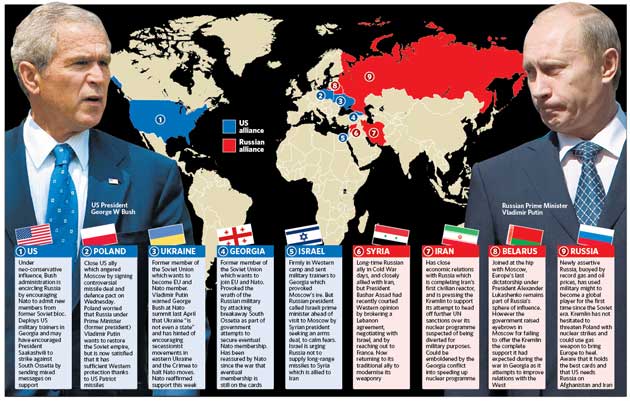Syria seeks weapons deal with Russia amid 'Cold War' ripples
Big-power strategic alliances shift as result of Georgia conflict

The ripples from a short and brutal war in the Caucasus spread out to encompass the Middle East yesterday, when the Syrian president rekindled a strategic alliance with Moscow that had been neglected since the Cold War.
The consequences of Russia's six-day war in Georgia have spiralled outwards every day since a French-brokered ceasefire was signed last week.
While the US and Russia initially confined their proxy war to flights of rhetoric, by yesterday Washington and the Kremlin were taking real punitive steps which show no signs of abating.
The arms talks between the Syrian and Russian presidents in the Black Sea resort of Sochi were the most public illustration of how alliances are shifting as a result of the war.
President Bashar al-Assad had flirted with the West of late and was a guest of honour at France's Bastille Day parade last month. Before the Georgia war, the West had high hopes of prising him away from Syria's key ally Iran, which the US accuses of supporting Islamic militants.
Those hopes were dashed when Mr Assad discussed an arms deal with President Dmitry Medvedev. A diplomatic source in Moscow said the leaders were preparing deals involving anti-aircraft and anti-tank missile systems.
Mr Assad issued a clear message of support for Russia's military crackdown in Georgia, which began after Georgian forces attempted to rein in the separatist territory of South Ossetia. "We understand the essence of the Russian position and its military response," Mr Assad told Mr Medvedev. "We believe Russia was responding to the Georgian provocation."
Washington and the other 26 Nato members have condemned Russia's "excessive" retaliation, which took Russian troops deep into Georgia proper. Speaking at an emergency meeting of Nato foreign ministers on Tuesday, the US Secretary of State, Condoleezza Rice, warned Russia against attempting to redraw the lines of the Cold War through stamping out by force Georgia's bid for Nato membership.
However, Mr Assad's talks in Sochi appeared to be a direct rebuff to Ms Rice, and came one day after the US and Poland inflamed relations with Russia further by signing a missile deal. Although the Polish government said there was no connection between the deal and the Georgia offensive, it seems Washington yielded to its demands for a battery of Patriot missiles to defend Warsaw in light of the six-day war.
Prime Minister Vladimir Putin's newly assertive Russia has long opposed Nato membership for Georgia and the Ukraine, as the Nato states encroach on its borders. It has now shown that it is prepared to use force to prevent the Nato expansion. Russia has also fiercely opposed US plans to base parts of a missile defence shield in Poland, and has threatened to retaliate against Poland with a possible nuclear strike over the deal, which was signed on Wednesday.
Diplomats said the Polish government fears that Moscow may be tempted to switch off gas supplies to the former Soviet satellite republic, something it has not hesitated to do in the past.
At their crisis meeting, the Nato foreign ministers reiterated support for Georgia and Ukraine's eventual Nato membership – but the alliance has made it clear that it is not prepared to use military force. Its charter only guarantees military support for member countries that are under attack.
The US ambassador to Nato confirmed yesterday that on the eve of the attack on 7 August, Washington urged Georgia not to fall into a Russian trap by using force to recover South Ossetia.
"Including the day before Georgian troops went into South Ossetia, we said, 'don't do it, don't be drawn into a military conflict, it's not in your interest'," the ambassador, Kurt Volker, told Norway's Institute of International Affairs. "But the pressure on [Georgia] was too great and they felt they had to act... that gave Russia the excuse they were looking for to launch a massive military operation with over 20,000 troops."
Russia retaliated yesterday against Nato's decision to freeze relations with Moscow until its troops left Georgia. Nato said it had received notification through military channels that Russia's Defence Ministry had decided "to halt military co-operation events between Russia and Nato countries until further instructions".
Three Nato warships entered the Black Sea yesterday for what Nato said were long-planned exercises.
Join our commenting forum
Join thought-provoking conversations, follow other Independent readers and see their replies
Comments